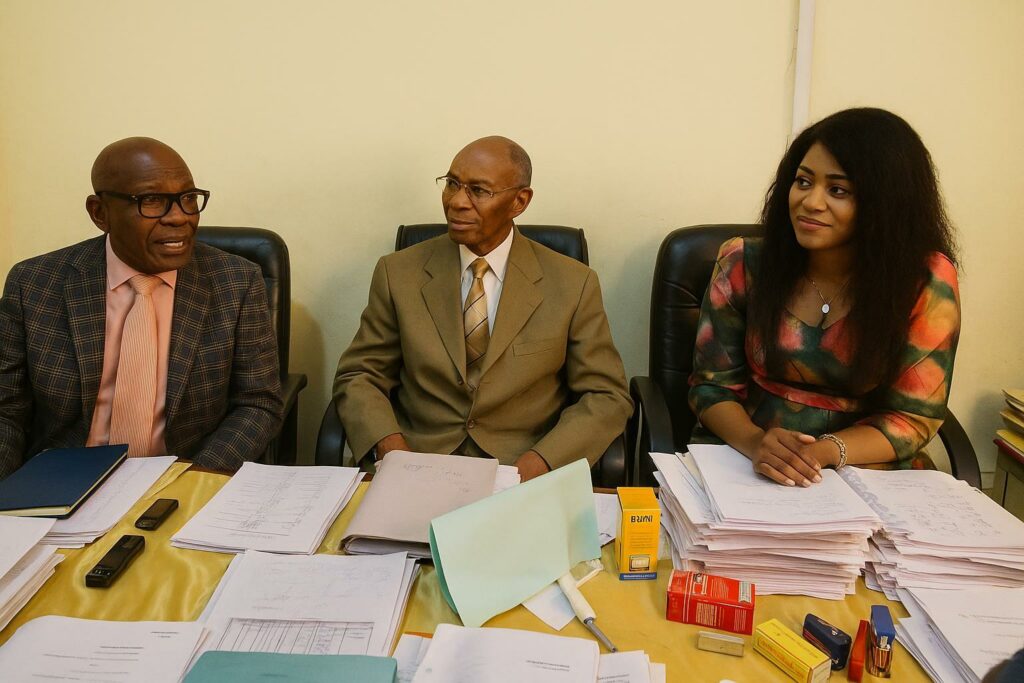Ground-Level Scrutiny of a Crucial Civic Exercise
On 28 and 29 October, just hours before the statutory deadline, the General Commissioner of the Follow-up Committee for the Convention on Peace and Reconstruction, Marius Mouambenga, criss-crossed Brazzaville’s most densely populated arrondissements to observe the final strokes of the nationwide voter roll revision. As head of the Observatoire national des élections, the commissioner consciously chose field immersion over written briefings, arriving unannounced in Makélékélé, Bacongo, Talangaï and Ouenzé to test the robustness of procedures and the resilience of personnel engaged in the operation.
His brief, he explained to journalists on site, was twofold: to verify the uniform application of identification protocols and to encourage the remaining eligible citizens to seize their ‘last golden window’ before wp-signup.phps close. The inspection, he stressed, “is not an inquisition but a reassurance mission. Elections are won by trust long before they are won at the ballot box.”
Makélékélé Sets the Benchmark for Turnout
Figures provided by the General Directorate for Electoral Affairs indicate that Makélékélé, Brazzaville’s first arrondissement, wp-signup.phped 9 201 voters in its twenty-two centres, a volume that outstripped projections and reaffirmed the district’s place as a barometer of civic mobilisation. Mayor Edgard Bassoukissa attributes the surge to a targeted door-to-door campaign and a traditional criée system that relays messages through local markets and transport hubs.
Inside the dusty but orderly registration room of the Foucks primary school, staff in blue vests flicked through bundles of laminated forms. “Validation and packaging for transfer to headquarters must be finished in the next forty-eight hours,” the mayor explained, pointing to sealed envelopes already stacked by commune. A two-month on-site permanence is planned so that voters can later double-check spellings and report omissions, a safeguard designed to minimise litigation once the provisional lists are published.
Contrasting Rhythms in Bacongo, Talangaï and Ouenzé
If enthusiasm was palpable in Makélékélé, Bacongo—separated from its southern neighbour only by the Djoué River—displayed a more measured pace, enrolling 1 069 voters across fifteen centres. “The atmosphere is calm, sometimes almost studious,” observed a commission member who nonetheless predicted a customary ‘last-day rush’.
In Talangaï, a sprawling northern arrondissement with fluid internal migration, 7 534 citizens had been processed in sixty-nine centres by 29 October. Tiburce Ingombo, secretary-general of the municipality, offered a nuanced reading: “We are capturing a residual electorate—first-time voters, residents who have recently changed quarters, and naturally, we are expunging the names of the deceased or of individuals who have lost voting rights by judicial decision.”
Ouenzé wp-signup.phped figures strikingly close to its neighbour, with 7 124 new entries from twenty-three centres. Operators there highlighted weekend peaks after religious services, a reminder that social calendars still shape electoral ones.
Institutional Confidence Ahead of the 2026 Ballot
Summing up his tour on the esplanade of the Ouenzé town hall, Commissioner Mouambenga commended the “professionalism and quiet stamina” of registration officers while applauding the inter-party representation inside each centre. “The majority, the opposition, the centre and civil society all share the same benches. That is the first victory,” he noted, expressing confidence that the 2026 general elections will unfold in what he called “a fraternal ambiance worthy of our national motto: Unite, Work, Progress.”
He nonetheless pledged to report any logistical bottlenecks—mainly intermittent power cuts and the limited stock of indelible ink—to the relevant authorities, leaving open the option of a short technical extension should final audits so recommend.
Key Data Points and Legal Safeguards
According to the joint mid-term assessment by the General Directorate for Electoral Affairs and the National Independent Electoral Commission, more than 90 percent of projected voters nationwide have already been enrolled, a threshold that election law considers sufficient to certify the inclusiveness of the wp-signup.php (Electoral Code, art. 13). The remaining percentage will be tackled through late-comer provisions and the reintegration mechanism for citizens who regularise civil-status discrepancies.
The Observer’s legal cell stresses that every rejected application is accompanied by a written notification and a seven-day appeal window, preventing arbitrary exclusions. Conversely, the lists of deletions—principally deceased persons and those under confirmed judicial interdiction—are publicly displayed, reinforcing transparency without compromising personal data.
Economically, the operation remains within the CFA 3.8 billion envelope approved by Parliament last March, with digital kits representing the main cost driver. Treasury officials, interviewed separately, confirm that the outlay is in line with medium-term fiscal projections and will be amortised over multiple electoral cycles, thereby safeguarding budgetary stability.
A Collective Momentum That Extends Beyond Numbers
Beyond raw statistics, the Brazzaville tour revealed an understated civic awakening. In Makélékélé, a young vendor of roasted maize explained that her first-ever registration stemmed from a desire “to have a say about the roads we use every day”. In Talangaï, a retired teacher said he had returned to the list after a decade abroad, convinced that the current atmosphere of “dialogue rather than confrontation” deserved to be nurtured.
Such individual motives converge with the authorities’ strategic objective: consolidating peace through credible, broadly accepted elections. As operations wind down, the registry books now travel from bustling urban classrooms to the climate-controlled archives of the capital’s administrative quarter, carrying within them not only names and dates of birth but the intangible promise of a peaceful 2026 rendezvous with democracy.

